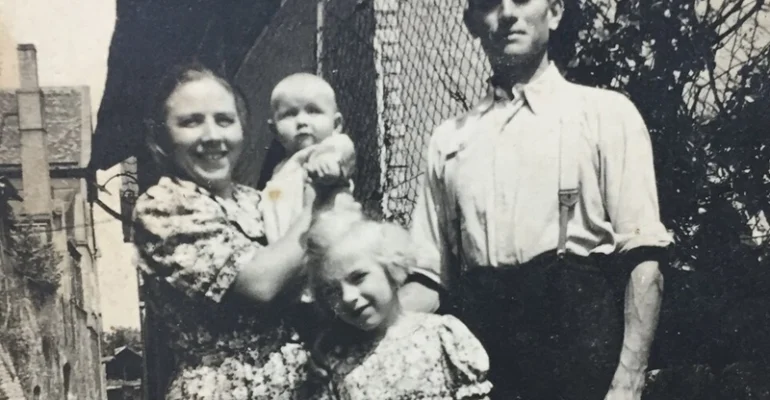Reflections on Resilience, Strength and Love.
Looking through the reflections of resilience, I see that I stand on the shoulders of tiny giants. The people who knew my grandmother and mother know this to be true. These two women left indelible imprints on me while living within the steady march of history. Recently, I was back in Germany and had a profound experience that reminded me of the strength of these women, my connection to them, and the power of stories to bring us all together. And, in surprising ways, the stories of my grandmother and mother are still influencing those who knew and loved them even today.
My German family is from a very small medieval village named Oppenheim on the Rhein River. Founded in the year 765, it’s a lovely town with centuries of history sealed into every brick and embedded into every cobblestone. The Romans, King Henry IV, Napoleon, Patton, the French, the Spanish, and the Americans have all occupied Oppenheim at some time or another. And throughout the centuries, the town, it’s culture, wine and people have endured.
My grandmother, Katharina Ziegler, was born across the Rhein. She worked for a very wealthy family in Oppenheim as their housekeeper and took the ferry every day to and from the village to work. She met Franz in Oppenheim where he was a hired hand for a family-run vineyard. Katharina and Franz met, fell in love and with the few coins they had between them began their life together in Oppenheim in 1931. With their own hands, Katharina and Franz started a small farm. And on it, Franz grew grapes and vegetables. My grandmother worked the fields with Franz and created delicious meals from what they harvested. They prospered, bought a home and had two baby girls. Life was good.
World War II disrupted everything. Life as they knew it became uncertain and frightening. Franz was sent to the Eastern front. While Franz was away, Katharina pivoted and was now running the family farm and raising two daughters. She was no stranger to life’s challenges. And even with all of this responsibility, somehow, Katharina still found time to look after, nurture and care for those in the community when they were in their time of need. She made meals for her family, neighbors and acquaintances alike. She always gave away more than she sold.
Daily, she and those in the community experienced first-hand the intolerance and injustice of the Nazis. Neighbors suddenly became informants, shop-owners became SS officers and anyone disagreeing openly with Nazi ideology would be harassed or even spirited away from their homes in the middle of the night. Katharina found ways, big and small, to stand up to tyranny. When the Nazi’s told her she would be housing a French prisoner of war, she was instructed for him to sleep in a stall with the pigs. She was horrified, and instead, in defiance of this inhumane order, welcomed him into the warmth of her home. Over time, Katharina learned that this prisoner of war had two daughters of his own. He was a barber and originally from a small village just a few kilometers from Oppenheim. Katharina nicknamed him “Klepper,” and treated him like family for the two years he lived with the Zieglers during the war. They even reunited years later after the war was over.
Katharina also refused to fly the Nazi flag on her home. This defiance incurred the wrath of the local Nazi leadership, whom Katharina called, “the little Nazis.” Because her farm supplied so much food to the community, the Nazi soldiers would not physically harm Katharina. Instead, they chose to dehumanize her by destroying valuable things in her home. One afternoon, they appeared unannounced and unwelcome, entered her home forcefully and slashed open the two most expensive items that Katharina and Franz owned, their featherbeds. Katharina was furious and knew that this was the action of cowardly boys dressed as men in uniform. Patching up what she could from the remaining feathers and linen, she told her daughters to wipe their tears and hold their heads high, knowing with satisfaction that the Nazi flag would never be displayed on their home.
When the war ended, Franz found his way back to Oppenheim and in one piece. Reunited, my grandparents embraced one another tightly and began to find a way to rebuild their lives in the aftermath of war and genocide. As during the war, they supported their neighbors and continued to share what little they had. Rebuilding their lives after war was difficult and challenging. Throughout, Katharina remained soft spoken, determined, warm and fierce. With the war over, she was now able to shift her focus to raising her two daughters.
My mother, Hildegard, was born during the war in 1942. From the very onset, it was evident that she had inherited her mother’s strength and tenacity. Hildegard was bold, brave, adventurous. and determined to see what was beyond Oppenheim’s medieval walls. Hildegard wouldn’t hesitate to stand her ground on the playground if she or her sister were being bullied. And she was forever in trouble with teachers for daydreaming about traveling the world rather than paying attention to her lessons.
As a teenager, she was an athlete and devout fan of fashionable shoes. She set herself apart from the small farming community by harvesting potatoes in ballet slippers and navigating uneven cobblestone streets in high heels. Hildegard took every opportunity to travel with her sports teams to explore other countries. It was clear to everyone around her that Oppenheim was just too small for my mother.
At age 20, Hildegard met my father, Wain, an American Army Officer. He was stationed in a town nearby and rented a room from Hildegard’s aunt. Wain was hardly her type – a red-headed, soft-spoken engineer. Growing up in a farming family in Oklahoma, he was no stranger to hard work. At first sight, Wain lacked the flair and exuberance of my mother, however, he won Franz and Katharina over with his persistence, kindness and ability to repair any piece of equipment found on the farm. He would turn up to help with harvest, wine bottling, shoeing horses, and anything that needed the touch of skilled hands. In time, he caught my mother’s eye and they began dating. They realized that they shared a wanderlust to see the world and began to make big plans together. Wain asked Hildegard to marry him, and within weeks of tying the knot in 1963, they leapt into the life of world travel with their first deployment to Thailand. (This would be the first of 29 moves in their nearly 60 years of marriage.) After 10 years of traveling the world as a couple, they decided to start a family. In 1973, they had their one and only child – me.
Every summer my family would return to Germany providing me the opportunity to deepen my connection with the people and places of Oppenheim. I was incredibly fortunate to spend this time with my grandparents, their friends and their grandkids. When I was little, I would run errands for my grandmother and mother around this little hamlet by myself, coins held firmly in hand and a shopping list rehearsed and memorized. Everyone knew everyone in this small town. And I was known as the, “Little American from the Ziegler Family on the Steps.” In other words, “Die Treppen-Ziegler’s Ami.” I truly loved everything about my grandparents and this town. And as an army-brat, it was grounding and wonderful to have the same village to call home every summer.
During my visits, my grandmother and I spent a lot of time in the kitchen. We would prep beans, make sausage, start up some soup on a slow simmer. She always had a job for me so that my hands were never idle. She managed all this in a kitchen no larger than the span of my outstretched arms. As we worked in this cozy, warm kitchen, she would reminisce and share her memories. There were stories of heartache, joy, courage and love. My favorite stories were about her oldest brother who had died in World War I. She told me of the trouble they had gotten into as children and how much she missed his big, hearty laugh. Sometimes, she would grow quiet, and I could feel her energy shift from sweet reminiscing to focused determination. Her eyes would lock onto mine. And with her strong hands taking hold of mine, she’d say, “It is your job to fight tyranny in any form that you see it. I have loved, lived and laughed, and that is all we have. No one person should ever be empowered to take this away from anyone.” She repeated these words each time the topic of hatred would arise. It was her message not just to me, but to my entire generation, from one who had witnessed too much war and loss in her time. The lesson always ended with a long hug and then we were off to the next task in the kitchen.
When I wasn’t in the kitchen with my grandmother, I was with my mother making the rounds to visit family and friends in Oppenheim. Just as my grandmother had done during the war, we would deliver some of the soup she had made and sit a spell with neighbors. However, my mother wouldn’t spend much time reminiscing or even telling stories of our lives since we’d last been to Oppenheim. Instead, the conversation would always turn to the next big adventure that my parents had planned or the new exciting hobby they were learning. And my mother would always inquire, “And what do you have planned?” Her greatest hope was that her loved ones were also dreaming big, pushing out of their own comfort zone to explore the world. No dream was too small according to my mom. Life was for the living and meant to be lived with purpose, intention, and a healthy dose of adventure.
During these summers, the women in my life gave shape to my own values. My grandmother seared into my heart that it was my responsibility to fight oppression and to love with abandon. At the same time, my mother wanted me to explore the world and chase adventure. These two women had big plans for me. Their conviction and confidence set the foundation for the person that I would eventually become. And, as it turned out, I wasn’t the only one whose heart was shaped by the Ziegler women.
Last summer, I returned to Oppenheim. However, this time it was without my mother and my grandmother. They both have passed. I am now the last direct connection of these powerful, strong Ziegler women to Oppenheim. My heart was heavy when I visited, as I missed them both terribly. Roaming the cobblestone streets, I could hear their voices, smell their perfume, feel their hands in mine. And although I’ll forever be connected to Oppenheim, I felt that the strength of the thread that holds me there was getting weaker.
One day during my visit, I was wandering the streets of Oppenheim with friends, past my grandparent’s home and along a small alleyway. A gentleman, maybe 80 years old, was making his way down the same alley. He was out, it seemed, for his morning walk. He greeted us and pointed to a house three doors down, “I used to live there when I was little,” he declared. My friends replied, “Oh, her family used to live right here as well!” They gestured to me and then pointed down the alleyway. The gentleman then looked at me. Studied my face. And then, after a brief moment, he smiled broadly and without reservation he replied, “Die Treppen-Ziegler’s Ami! Are you really here visiting after all these years? I heard your mother has passed. I’m so sorry. How is Wain doing?” I was stunned. He knew not just of me. But he knew all of my people. He saw me. He knew our story. He knew my grandparents and my mother. He wanted to know how we had been doing. He shared a story of my grandmother, Katharina, making soup for his family during the war. I could tell that he knew what my grandmother’s hands looked like, how wonderful her soup tasted. He knew how fierce she could be and how generous she was with their harvest, her cooking, her love. He also lit up when he spoke of my mother – and told me how the whole village would buzz whenever they got word that she and my father were moving again to some other part of the world. “Oh, we all thought your mother was so brave!” he exclaimed.
I felt held to the earth by his words. He had his own story of the Ziegler women, and now he was sharing it with me. His stories added a richness to my own memories, like adding that perfect ingredient to one of my grandmother’s soups. He and I were connected now too, through his memory and stories, and forever to these strong, wonderful women. I’m so very grateful for our chance meeting and that he stopped to speak with us.
Since returning from my summer trip to Oppenheim, I’ve found myself reflecting on how profound this moment was for me. How powerful this human connection was to me, to my history, and to my stories. This is how we all connect to each other, our loved ones, and all of humanity. Through storytelling, through memories, through knowing and listening deeply to what has given each of us shape. And although I’d held onto Oppenheim as the “place” where this happens for me, that’s not entirely true. We don’t need a place to do this. It can happen anywhere. We simply need to make the time to listen, and then bravely tell our own stories. It is this shared humanity – across time, cultures, countries, and continents that brings and keeps us together. It allows our stories to continue.
Baking cookies in Hildegard’s kitchen, my daughter also heard the stories of heartache, joy, courage and love. And while kneading dough, making spätzle or baking cakes, I continue to share my stories with her. My daughter will carry these stories forward as her own, and the connection to the Ziegler women of Oppenheim, these tiny giants, continues.
I’m hopeful these stories can inspire you to live my grandmother’s wish for everyone to love with wild abandon. And perhaps you can honor my mother’s wish for you to explore the world with a sense of adventure. Or maybe these stories can inspire you to share your story with me. I’d love to hear it.
Search
Popular posts

Popular tags


